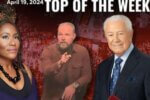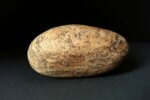Maui is famous for its pristine beaches and tropical splendor. But recently it has also become the center of a revival that is sweeping the Pacific Rim.
Early Sunday morning, as sunrise spills over the sugar cane valley where King’s Cathedral sits in Kahului, Maui, senior pastor James Marocco and his associate pastors pray intensely in a back room, laying hands on one another before the 7 a.m. service.
“Lord, may miracles be done!” one pastor cries. “Bring growth to the number of children worshiping,” implores another. The unwavering prayers are heartfelt and focused. And they are one reason why the Assemblies of God congregation has grown from a handful of people to thousands in just 21 years.
The building is large and is located at the most strategic highway intersection on the island, a stone’s throw from a sparkling new Home Depot and Wal-Mart. Even now, at 6:58 a.m., hundreds are here, ready to worship.
In the spacious, sunny sanctuary, the band cranks up the praise. People stand, clap, shout and sing. Many wear muumuus, leis, Hawaiian shirts. Sandals are kicked off to make dancing easier. This is far from an early-morning, old-folks service. It’s an energetic, Holy Spirit-inspired expression of absolute abandon to God.
“Behold He comes / Riding on the clouds / Shining like the sun / At the trumpet call,” the song goes, some of the words in Hawaiian.
During the celebration a group of Hawaiians perform a mesmerizing dance in which women motion with their hands, and men, wearing leis made of black Kukui nuts, bang the ground, jump in rhythm and lift muscled arms to Jesus. Their song thumps forward: “Every nation / Every rhythm / Every culture / Every race / Find expression in this place!”
The worshipers applaud and Marocco, an imposing man both physically and spiritually, initiates a time of prayer for dozens who come forward. The power of God crashes like a wave over those at the altar. It’s almost symbolic of the wave of revival that not only has changed the spiritual climate of Maui, but also has spread to communities throughout the Pacific Rim.
Invading Enemy Territory
It wasn’t long ago that Maui had no church with more than 150 people and virtually no Christian presence in the local culture. But in 1980, God tapped Marocco, then pastor of a large church in Honolulu, to go into enemy territory. “I knew God wanted to build a massive church here, reaching thousands,” he says.
Marocco came from a family of big-vision people. His parents were missionaries to India and started the work in Calcutta later taken over by Mark and Huldah Buntain. Marocco’s father succeeded Lester Sumrall as pastor of Manila Bethel Temple in the Philippines.
God gave Marocco a vision to be the pastor of Maui County’s three islands: Maui, Molokai and Lanai. In May 1980 he accepted the pastorate at what was then called First Assembly of God (now King’s Cathedral)–which was a small group who met in a little building that held 150. Attendance doubled on Marocco’s first Sunday, and in a year the church had grown to 700.
Marocco soon started buying property and building extension churches in other parts of Maui and Hawaii, in places he says were “very demonized.” Those extensions thrived and formed the basis for what he calls an “Ephesus model,” in which a central pastor and church retain financial and spiritual control of the churches they plant. Marocco is the senior pastor of every church extension he builds.
Today there are 15 extension churches on Maui and the other Hawaiian islands, French Polynesia, Alaska, Japan and northern California. The church is managing six building programs simultaneously. They soon will be opening churches in the Philippines.
Attendance in the Maui locations alone exceeds 3,000 per week. All this in a place most other preachers had given up for lost.
“The church has changed the whole nature of the island,” Marocco told Charisma. “When I came, everybody said, ‘Don’t go; it’s a graveyard of preachers.’ Other people had tried and failed to start churches in these places.
“Some even said there were demons controlling the islands from the top of the volcano,” he continues. “They didn’t understand that when God creates an anchor church in a given locale, He changes the spiritual temperature. Now this is called ‘revival island,’ and people are starting churches all over the place.”
At the extension church in Lahaina, Maui’s famous party town, Marocco arrives in time to preach to 50 eager souls gathered at a beautiful facility on a high-traffic corner. In a back room, two dozen kids learn about Jesus in Sunday school. The model here is the same as other extensions: Associate pastors cover most of the preaching duties, and Marocco visits and preaches periodically. The Lahaina extension is making a visible impact to counter the influence of debauchery and sensuality that have characterized the town for centuries.
Less than an hour later, Marocco is back in the car, driving along the emerald coast toward King’s Cathedral, which the main church is called, to preach the second morning service. The crowd is twice the size of the early service and engages in full-voiced, unified intercession for souls and the extension churches. After the sermon, eight more receive Christ and are immediately plugged into cell groups.
Thomas Hardy, 53, came to this altar 10 months ago and experienced a radical change. For 25 years, he says, he was a marijuana dealer. Born in the Midwest and brought up as a Roman Catholic, he became a Christian but backslid and went to South America to learn the drug business. Later he came to Hawaii and quickly became rich selling marijuana, but he felt there was no spiritual hope for him because he had turned his back on God.
“I would sit there, counting hundreds of thousands of dollars [after a sale], and be thinking, What profiteth it a man to gain the world but lose his soul?” Hardy says. “I felt like a failure.”
While scanning the television for football games one Sunday, he came upon Marocco’s broadcast. Hardy began to assess his life and made a list of all his failures: how he had lost his wife and kids and never finished his education.
Then one morning he turned on the television just when Marocco was pointing at the camera and saying, “If someone is telling you you’re worthless, that’s the devil.” Hardy was stunned. “I had to find out if I had another chance with God,” he recalls.
He went to a nearby church and waited for the altar call, but none was given. So he tried King’s Cathedral’s Sunday night service and waited. When the invitation came–“Bam! I hit that altar, knelt down and started praising the Lord,” he says, tears filling his eyes. “I can’t believe God walked with me for 25 years, spoke to me, kept after me. I grabbed onto God with both hands and feet.”
Taking Authority
Testimonies such as Hardy’s are a lot more common since a soul-winning work has been raised up on Maui. But spiritual opposition is still prevalent.
“The demon power is still at work in a strong way, but it’s lessened,” says Marocco, who, while a student at Fuller Seminary in Pasadena, California, in the 1970s, wrote his dissertation on demonology, one of the first of its kind. “There are moments when demonic power is anesthetized, and if the church is able to operate then, great strides in the advancement of the kingdom can take place. Prayer parts the clouds so the light of God’s blessing can shine. [At King’s Cathedral] we try to sustain prayer ministry to keep the clouds parted.”
Strong cell-group and visitation ministries characterize the church. One whole office, in fact, is dedicated to tracking cell-group attendance. Walls are covered with attendance graphs and charts.
When someone misses a cell-group meeting, it’s certain they will receive a phone call asking if they need some sort of assistance. Marocco pushes a consistent program of visitation, knocking on doors and handing out Bibles.
“One way you ‘bind and loose’ is by getting the gospel out of the church building,” he says. “[Visitation] makes the devil nervous because he tends to bank on the church only being in its four walls. When the church gets out of its four walls it disrupts the powers of darkness. We visit people as a way of saying: ‘We’re here, and this is our island. It doesn’t belong to the devil.'”
King’s Cathedral is better known on the mainland and around the world for hosting a bi-annual consortium for pastors and frequent conferences on topics such as prophetic ministry and the work of the Holy Spirit.
As dusk falls, several hundred people arrive and fill the cathedral again. The congregation is almost a perfect meld of ethnicity.
The service begins with a regal call to worship as four men blow conch shells. The band launches into high-energy praise, and people dance in the aisles. Men kick up their heels and twirl. Genuine joy fills the place as whoops and cheers go up. “This is how we overcome,” encourages one leader.
Soon exuberance turns to worship, and a sea of hands is lifted. “You came tonight to worship,” Marocco says. “Don’t let anything hinder you.” He likes to stroll around the front of the sanctuary, sensing how the Holy Spirit is moving, occasionally encouraging or directing.
He calls people who are depressed to come for prayer, and they jam the front. Pastors lay hands on them, and for the first time today, the normally low-key Marocco raises his voice: “In the name of Jesus, be set free! I said, Now!”
After the prayer and offering comes a special feature: a tribute to the first Christian convert on the islands, Queen Ka’ahumanu. A ukulele quartet and choir sing beautiful worship songs in Hawaiian. Dancers accompany them with the familiar, fluid motions of Hawaiian dance.
Marocco tells the history of this queen and draws applause when he announces that “this is the day for Hawaii again.” The service concludes with a prayer time. “I feel like God wants to launch a major revival in the islands,” Marocco says. “I want to pray specifically for people of the land–Hawaiians.”
Hundreds come forward, a third of the crowd. “The only way there will be revival is for people with roots here to declare what God has done,” the pastor asserts. “Lord, cause the Hawaiian community to find their identity in You. I pray that true aloha–Your aloha–would be in us. Let Your power sweep through these islands.”
The intensity of intercession rises, and it seems as if the power of God, like a volcano, is indeed about to erupt in answer to their prayer.
Joel Kilpatrick is a former associate editor for the Pentecostal Evangel and a free-lance writer based in the Los Angeles area. He is a frequent contributor to Charisma.
Country with largest percentage Christian population: St. Pierre & Miquelon (97.3 percent)
Country with smallest Christian population: St. Pierre & Miquelon (6,000)
Country with smallest percentage of Christians in population: Canada (65 percent)
Largest denomination: Roman Catholic Church, United States (56.7 million)
Largest Protestant or independent denomination: Southern Baptist (21 million)
Largest non-Christian population:Nonreligious (28 million)
Country with largest Christian growth over last five years: Bermuda (from 84 percent to 85 percent)
Fastest growing denomination or movement: Evangelical Free Church of Canada (26 percent)
Percentage of Pentecostals and charismatics in Christian population: 25 percent (79.5 million)
Most dangerous country for Christians: Greenland
Country with most evangelistic efforts for size of population: United States
Country with highest Christian income: United States
Country with lowest Christian income: St. Pierre & Miquelon






Leave a Comment
You must be logged in to post a comment.